Guinea / République de Guinée / 𞤈𞤫𞤲𞥆𞤣𞤢𞥄𞤲𞤣𞤭 𞤘𞤭𞤲𞤫 / ߖߌ߬ߣߍ߫ ߞߊ ߝߊߛߏߖߊߡߊߣߊ – Let’s explore here
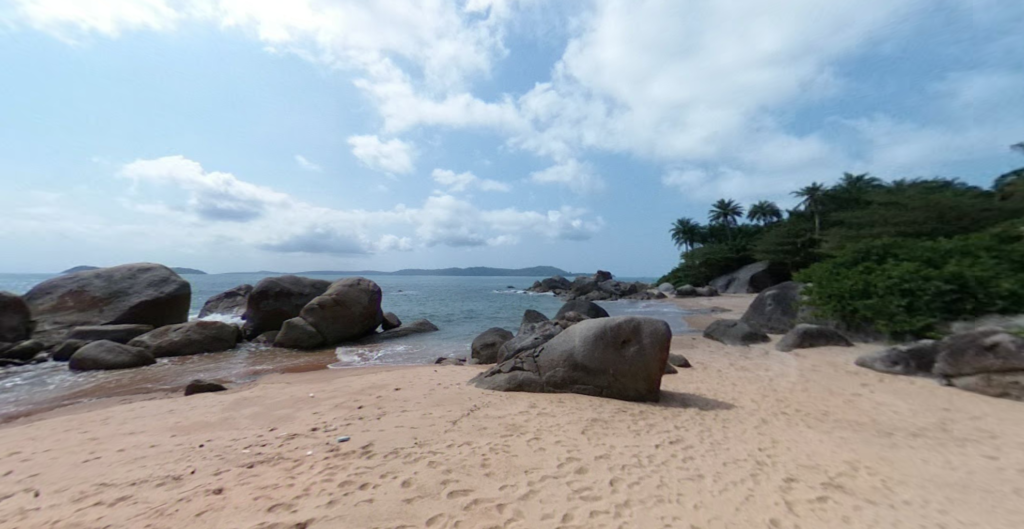
What’s it like in Guinea?
Guinea is a poor, mainly flat country in western Africa that meets the coast of the Atlantic Ocean. It’s about the same size as the UK, and mainly consists of mountains running north – south through the centre, jungle in the south east, with lowland savannah grasslands and mangrove swamps elsewhere. The highest point in the country is Mount Nimba, on the western border with Cote d’Ivoire, at 5,748 ft (1,752 m) above sea level.
It has a short and turbulent history, involving much political instability, resulting in it being one of the least developed and poorest countries on the planet. It shares land borders with Liberia, Sierra Leone, Cote d’Ivoire, Mali, Senegal and Guinea-Bissau.
The population of Guinea is around 14 million people (2024), about 1½ million of whom live in the metropolitan area of the capital, Conakry.
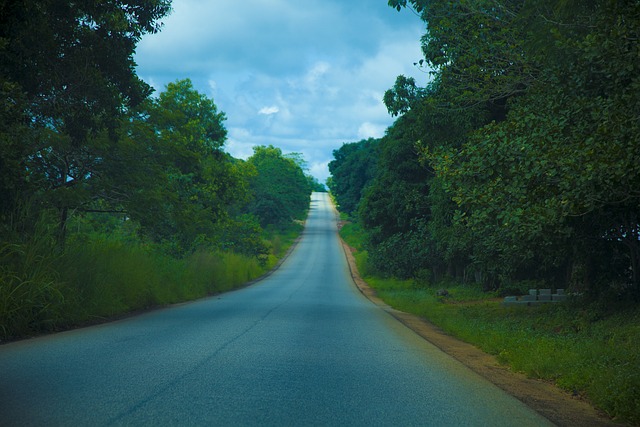
A bit about the history of Guinea
Pre-colonial Period
Before European colonisation, Guinea was home to several powerful societies, including the Manding, Susu and Fula peoples. These societies had complex social and political structures, and trade, including in gold, salt and slaves, was central to the region’s economy. The Kingdom of Guinea (also known as the Kingdom of the Fouta Djallon) was an important centre of power in the 18th and 19th centuries.
Colonial Era
Guinea became a French colony in the late 19th century, part of French West Africa. Under French rule, the region was subjected to economic exploitation, with the colonial government focusing on resource extraction, including bauxite, and the use of forced labour. In the early 20th century, a growing sense of nationalist sentiment developed among Guineans, influenced by the broader wave of decolonisation across Africa.
Struggle for Independence
In 1958, Guinea became the first African colony to reject Charles de Gaulle’s proposal for a French Community, opting for full independence instead. On October 2, 1958, Guinea officially declared independence, with Ahmed Sékou Touré becoming the country’s first president. Touré’s government established a one-party state, aligned itself with socialist ideals, and sought to break away from French influence. The country’s refusal to remain part of the French Community set a precedent for other African nations’ independence struggles.
Post-independence Period
Ahmed Sékou Touré’s rule from 1958 to 1984 was marked by authoritarian policies, including political repression and the establishment of a secret police force. While Touré pursued ambitious plans for economic development, his government faced significant challenges, including poverty, corruption, and the isolation of Guinea from many Western nations. The regime also relied heavily on Soviet support during the Cold War.
Death of Sékou Touré and Military Rule
After Touré’s death in 1984, his government was replaced by a military regime led by Lansana Conté, who assumed power in a coup. Conté’s rule lasted until his death in 2008 and was characterised by a combination of military governance and civilian leadership. During his time in power, Guinea saw some economic development, particularly in the mining sector, but it was also plagued by corruption, human rights abuses and political instability.
Post-Conté Era and Political Unrest
Lansana Conté died in 2008, and his death led to another military coup, this time led by Captain Moussa Dadis Camara. Camara promised a transition to civilian rule but his leadership quickly became notorious for human rights abuses. In 2009, a massacre of opposition supporters occurred at a stadium in Conakry, drawing widespread international condemnation. After Camara was wounded in an assassination attempt, a transitional government was formed, and in 2010, Guinea held its first democratic elections. Alpha Condé, a long-time opposition leader, won the presidency, becoming Guinea’s first democratically elected president.
Democratic Transition and Challenges
Alpha Condé’s presidency (2010-2021) saw some progress in terms of democratic reforms and infrastructure development. However, his government was marked by accusations of corruption, human rights abuses and growing discontent. Condé was re-elected in 2015 and again in 2020, but his attempts to change the constitution to allow a third term led to widespread protests and political tensions. In 2021, following months of protests and a disputed election, Condé was ousted in a military coup led by Colonel Mamady Doumbouya. The coup was sparked by growing dissatisfaction with Condé’s leadership and allegations of electoral fraud and authoritarianism.
Recent Developments
Following the coup, Doumbouya’s military junta took control of the country, and a transition period was announced. The military promised to hold elections in a reasonable timeframe, although international pressure has mounted for a return to civilian rule. Guinea has faced significant economic challenges, including the impact of COVID-19, while the political landscape remains fragile. By 2025, Guinea remains in a period of political uncertainty, as the military junta continues to navigate the path towards democratic restoration. The country faces significant challenges in terms of governance, economic development and security, but efforts towards stabilisation and reform are ongoing. The people of Guinea continue to strive for peace, stability, and prosperity, with hopes for a peaceful and democratic future.
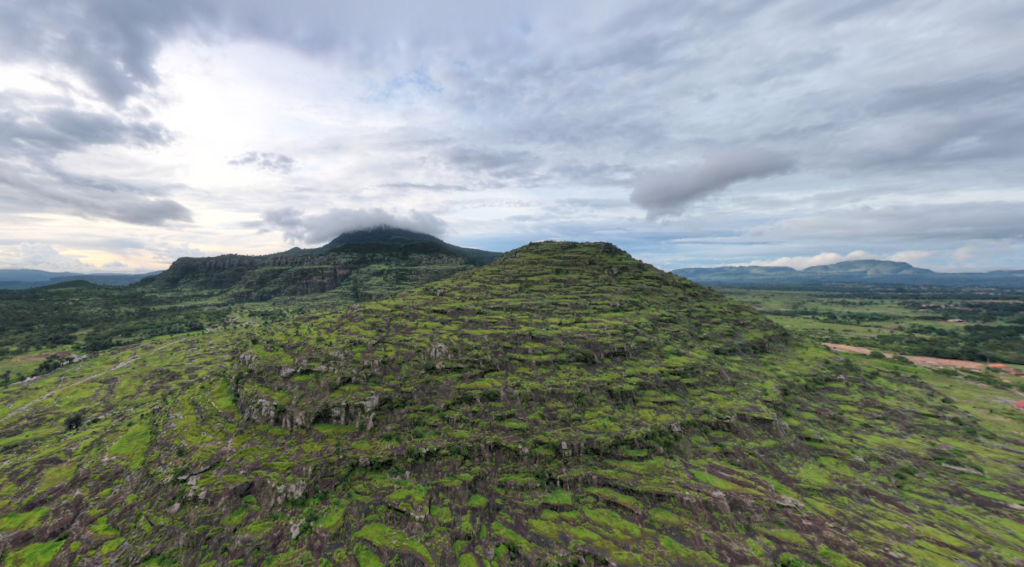
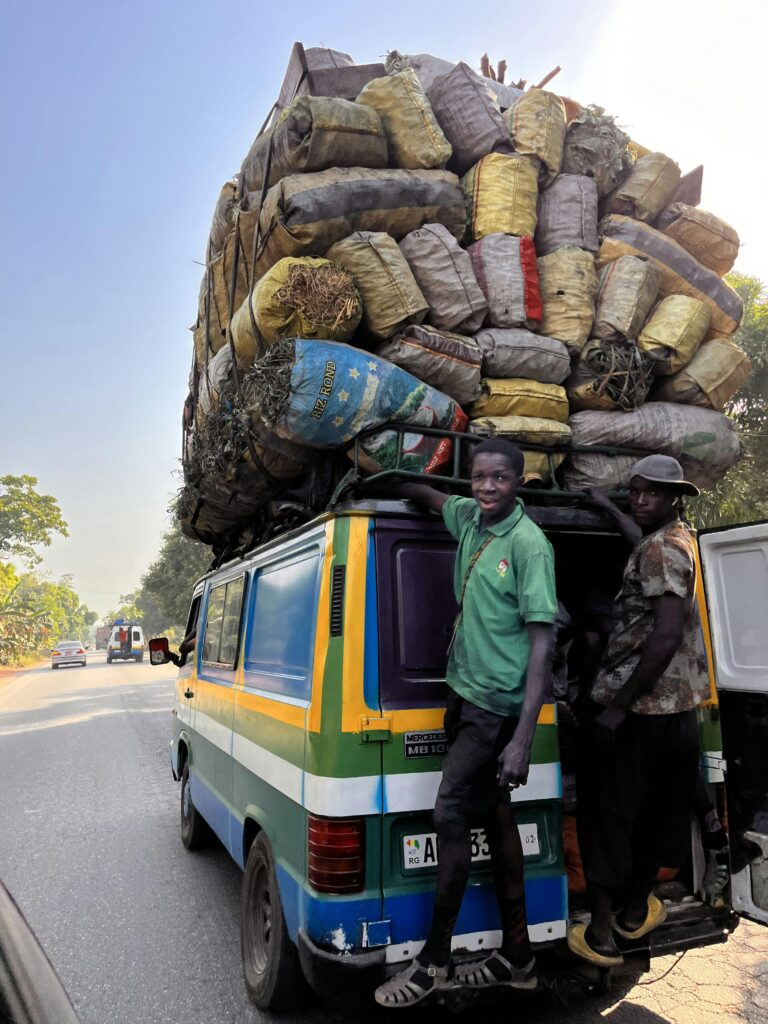
Guinea road trip
Our Guinean road trip is part of a much larger African road trip.
Our current planned Guinean road trip takes us from Guinea-Bissau, heading roughly southwards towards the capital, Conakry, before heading East to Sierra Leone.
No doubt we’ll explore the country much more than this continent-spanning short route shows, in particular checking out the capital and inland Guinea.
Hopefully our journey will improve our knowledge of this intriguing and beautiful country, and enable us to meet some interesting people. We’ll be updating this page at that time – don’t forget to check back 🙂
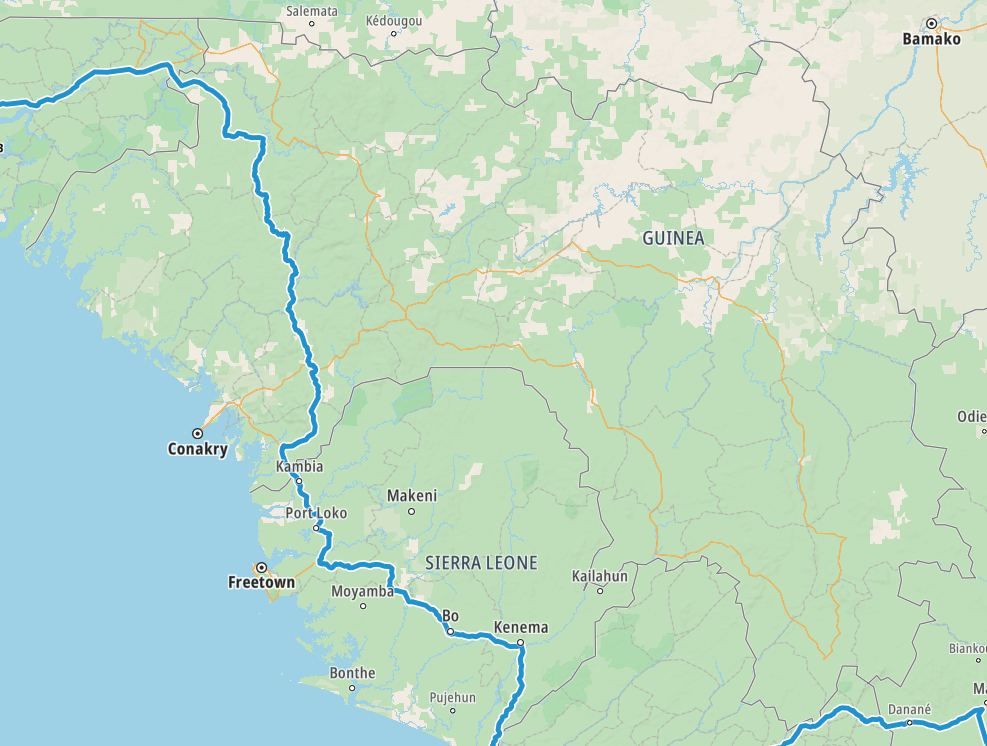
What’s it like to drive in Guinea?
They drive on the right hand side of the road in Guinea. In the main, roads are quite poor, with many being unsurfaced dirt tracks. Driving standards are also poor.
Do you require an international driving permit in Guinea?
We’ve created a dedicated page to driving abroad, which answers this question, and more, which you might find helpful.
Can you use your UK driving license when driving through Guinea?
We’ve created a dedicated page to driving abroad, which answers this question, and more, which you might find helpful.
Do I need a carnet de passages to drive in Guinea?
We’ve created a dedicated page to driving abroad, which answers this question, and more, which you might find helpful.
What currency do they use in Guinea?
In Guinea they use the Guinean franc. Cash is widely used. The use of credit / debit cards is not widely accepted. Travellers cheques are not generally accepted. There are few ATMs outside of the capital.
You should make yourself aware of the amount that your bank charges you for using credit and debit cards abroad. Often credit cards are cheaper for purchasing items directly, and for withdrawing cash from ATMs.
What language do they speak in Guinea?
They mainly speak Malinké and Fula in Guinea, although French is also widely spoken, and is the official language. English is not widely spoken.
What time zone is Guinea in?
Remember, when you’re planning your next trip to take a look at what time zone it’s in.
Do I need a visa to visit Guinea?
We’ve created a dedicated, more comprehensive page on visas, which you should find helpful. Check it out!
Is wild camping legal in Guinea?
Yes, wild camping is fine in Guinea.
What plug / socket type do they use in Guinea?
In Burkina Faso they use plug / socket types C, F and K.



Health issues in Guinea
Is it safe to drink water in Guinea?
No, it is not safe to drink tap water in Guinea. Bottled water is readily available throughout the country.
What vaccinations are required for Guinea?
This NHS website is kept up to date with all relevant information on vaccinations in Guinea.
Phones in Guinea
What is the country calling code for Guinea?
The country calling code for Guinea is +224
What are the emergency phone numbers in Guinea?
- The emergency number for police in Guinea is: 117
- In Guinea, the emergency number for ambulance is: 18
- The emergency number for fire in Guinea is: 442-020
If you’ve got some useful info that you’d like to share, let us know!
And don’t forget to check out all the other pictures!
